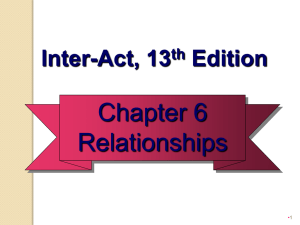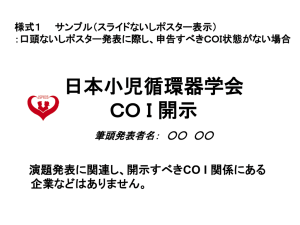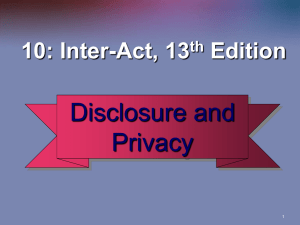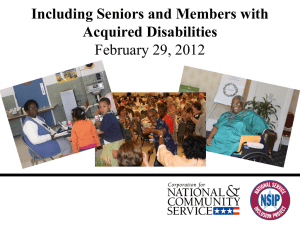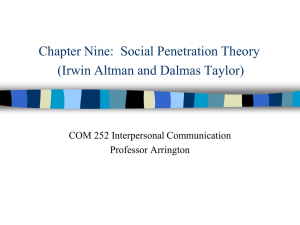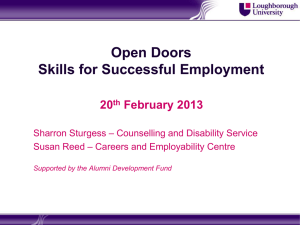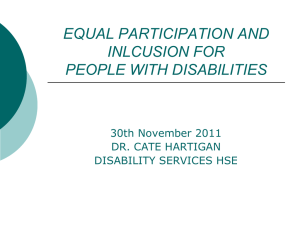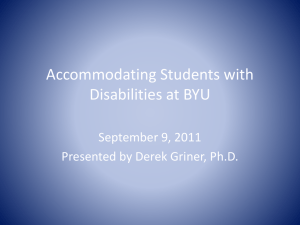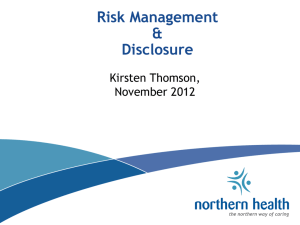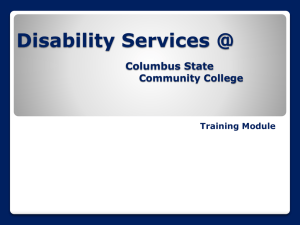Disclosure - National Service Inclusion Project
advertisement
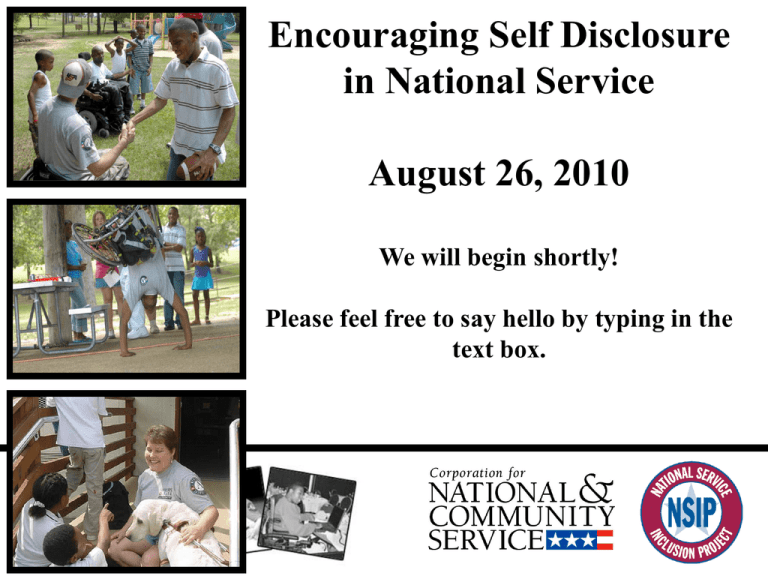
Encouraging Self Disclosure in National Service August 26, 2010 We will begin shortly! Please feel free to say hello by typing in the text box. www.serviceandinclusion.org Toll-free hotline: 888-491-0326 (voice/TTY) Communicating During the Webinar To contribute to the discussion and/or ask questions, you may: •Type in the chat window of the current page •Share information through our Twitter account: http://twitter.com/NSIP_Online •Email or Gmail chat with us at NSIPlive@gmail.com •Call us at 617-287-4329 to leave comment Encouraging Self Disclosure in National Service Presenters: Chad Gobert Joseph Tierney Hillary Vargas What is self-disclosure? Self-Disclosure Self-disclosure refers to your communicating information about yourself and may involve: 1. Your values, beliefs, and desires 2. Your behavior 3. Your self-qualities or characteristics Reasons Individuals Self-Disclose • • • • Catharsis Self-clarification, self-validation Reciprocity and impression management Relationship maintenance and enhancement Benefits of disclosure in service • Benefits in service – Individual service performance – Serving with others • Comfort in asking for reasonable accommodations How Willing to Self-Disclose Are You? 5 = would definitely self-disclose 4 = would probably self-disclose 3 = don’t know 2 = would probably not self-disclose 1 = would definitely not self-disclose Rate on a scale of 1 – 5 the following questions: 1. What are your hobbies? 2. What is your worst fear? 3. What aspects of your personality do you dislike? 4. What is your educational background and how do you feel about it? Johari Window The Johari window is a way of showing how much information you and others know about yourself. Known to Self Unknown to Self Known to Others Open Pane Known to self and others Blind Pane Blind to self, seen by others Unknown to Others Hidden Pane Open to self, hidden from others Unknown Pane Unknown to self and others True or False? In a typical relationship, the sooner an individual engages in self-disclosure, the better the relationship will be. FALSE- why? Why not simply disclose? • Culture of program environment – “Gossipy” – Excessively competitive – Racially insensitive • Fear of potential reactions • Refusal by others to share equipment • Not relevant • Stigma associated with disability • Need to disclose to other people outside of service program first The Law Does NOT Permit Programs to Inquire into Disability, BUT… • Pursuant to Section 503 of the Rehab. Act, a program may invite applicants to voluntarily self-identify as an individual with a disability for affirmative action purposes, so long as this information is kept private and confidential. • Voluntary Disclosure – An individual with a disability may voluntarily disclose to anyone she or he chooses – Voluntary Disclosure ≠ waiver of confidentiality When Service Members Should Disclose • Reasonable Accommodations – If a service member/applicant with a non-apparent disability requests a reasonable accommodation, the program may ask the individual for reasonable documentation about his/her disability or functional limitations, and the member must provide such documentation in order to receive accommodations. • Post Offer Medical Exams – A program may condition offers on applicants satisfactorily completing post-offer medical examinations, which may yield disability-related information. – Note: programs can only condition offers on such medical exams if they require that all prospective members take such exams Impact of non-disclosure • Social isolation – Did not get close to people for fear of personal questions • Feel compelled to misrepresent – Explained medical appointments by saying she was part of a nutritional study – One individual told others she had a different diagnosis • Unable to request accommodations • Report less support than people who did disclose • Stress of keeping the secret Member Stories Discussion 1. Why/when do you choose to disclose/not disclose? 2. In times when you did/did not disclose, how comfortable or uncomfortable did you feel? a. What contributed to feeling more or less comfortable after disclosing? b. Upon reflection, did you agree with your concerns after the disclosure was/was not made? 3. What advice would you have for those who may decide to disclose their disability? 4. What advice would you have for supervisors to encourage disclosure? Member Stories Hillary Vargas, Teacher Partner for The Learning Community and AmeriCorps Alumni Calling from Providence, RI Promoting disclosure in your program • Availability of reasonable accommodations is openly posted and publicized • Individuals are asked about their experience and satisfaction • Individuals with disabilities are full participants in program and service activities • Making sure expectations for individuals with disabilities are the same as for others • Display of statements, such as “Qualified individuals with disabilities and those from diverse backgrounds are strongly encouraged to apply. We provide reasonable accommodations for qualified individuals and conduct all activities in fully accessible settings.” • Questions and solutions naturally arise about accessibility when planning activities • Products and interior decorations portray images of people with disabilities Guidelines for Responding to Self-Disclosure • Practice the skills of effective and active listening • Support and reinforce the discloser • Keep the disclosures confidential Things to Remember about Disclosure • It is up to the individual to disclose a disability • The amount of information provided about a disability is up to the individual • If an individual discloses a disability, that information must be maintained confidentially and cannot be disclosed to others • May share information regarding disabilities if member provides approval in writing or alternative verifiable method • Human Resource personnel and supervisors are trained/informed in the confidentiality of medical, disability and accommodation-related information Questions? Thank you for attending! Chad Gobert Chad.Gobert@umb.edu Joseph Tierney Joseph.Tierney@umb.edu We want your feedback about this webinar: http://www.surveygizmo.co m/s/355527/nsip-webinarfeedback-august-2010
